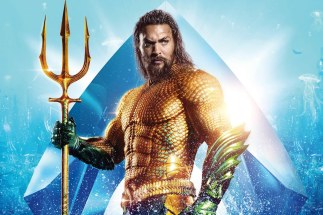The Fish and the Devil

I’m a little late to the party with some of the more recent superhero media available (it’s finally coming out so quickly and consistently that I can’t consume it all as it arrives anymore), but this past week I finally saw Aquaman with Bridget. It was a thoroughly entertaining movie, but it does suffer from a number of nitpicks that definitely keep it out of the A-list of big-budget superhero movies. However, my goal today is not to review the film (though I will happily discuss it in the comments) but rather to draw attention to one particular part of the film and compare it with another superhero property. In doing this, I will do my very best to keep spoilers to a minimum by not describing the context of the issue in question any more than is necessary.
One of the things that matters the very most to me when watching a superhero movie or TV show is the dialogue used to express what it means to be a hero and why that is important. As I have written previously, I think this is the most important element of these productions for our popular culture. The “hero speeches” in Aquaman are fairly brief (and most of the most important one is contained in the trailer, of course). They do the job but I can’t say I left the theater with a very strong sense of why Arthur Curry is a hero when compared to his peers Superman and Batman. I came away understanding that being a hero is important, and he was considered a hero, but I wasn’t fully sure what that meant for this character.
When talking about superheroes and virtues, one critical issue for me is the issue of killing. This is controversial among some comic book fans, I suppose, but by and large, I think superheroes are not good superheroes if they kill their opponents – even when that seems totally impractical (Batman and the Joker readily come to mind here). A superhero might accidentally kill someone, or he or she might be pressured to do so in order to save the universe, but these decisions are rare and not to be taken lightly, and they should have a lasting effect on a hero.
Without getting into too much detail, there is a death early on in Aquaman, a death that could have been prevented. When it occurred, my wife and I both said, “That’s not a good thing,” confident that it would come up again later in the film. It did – but the discussion of it had very little to do with the objective wrongness of the act. The hero regretted the death because it caused inconvenience to people he had come to care about and had led to other deaths. There’s nothing wrong with these reasons for regret, but they should have been combined with the realization that we are called to a higher standard – a heroic standard that doesn’t evaluate morality solely by pragmatic or utilitarian terms.
This failure was not enough for me to say I didn’t like the movie, but like I said, there was little to distinguish this “superhero” movie from “action movie with a protagonist who happens to have superpowers.”
Bridget and I also plowed through Season 3 of Netflix’s Daredevil this past week. It came out a few months ago, but we needed the Christmas break to have time to focus on it.
Talk about a contrast.
There is no question that this show was the best of the 11 seasons of all the Netflix Marvel shows and among the best superhero television or movies so far produced by anyone. It’s that good.
It also happens to have the issue of killing at the forefront of the hero’s story. I won’t spoil who does or does not kill, but there are several conversations about what killing means and what killing does to a person. The show makes it clear that it adversely affects a person no matter how justified the act might be. We get to see some of these effects on the characters. Throughout it all, there is a very clear message: killing, even if done for supposedly noble or justifiable reasons, is objectively wrong and always leaves scars.
On a different note (and slightly off topic), this season of Daredevil also does an excellent job of framing specifically Catholic thought in the violent life of a superhero, providing a priest and a nun who, while unconventional in some senses, give real, human portrayals of both the truth of good and evil, God and free will, and the struggle to actually live that truth. This is worthy of a conversation in itself, but perhaps that should wait for another time. For now, I’ll just say that any Catholic interested in both the moral life and superheroes should see this show.
Thus, we have two different superhero presentations: one is bright, colorful, clearly larger than life, and aimed at a wide audience. The other is dark, brutal, and sometimes difficult to watch. Yet Aquaman fails in its portrayal of a compelling moral vision. Given how many more people, especially young people, are going to see this movie, that’s unfortunate. Warner Brothers is still struggling to follow Marvel’s lead in making excellent movies about their characters (Wonder Woman, so far, has been a wonderful fluke). I believe a significant part of that struggle is the way they portray their characters. More than trying so hard to get the “cinematic universe” that Marvel Studios has produced, perhaps they should give some thought about what it really means to be a hero in the first place.
